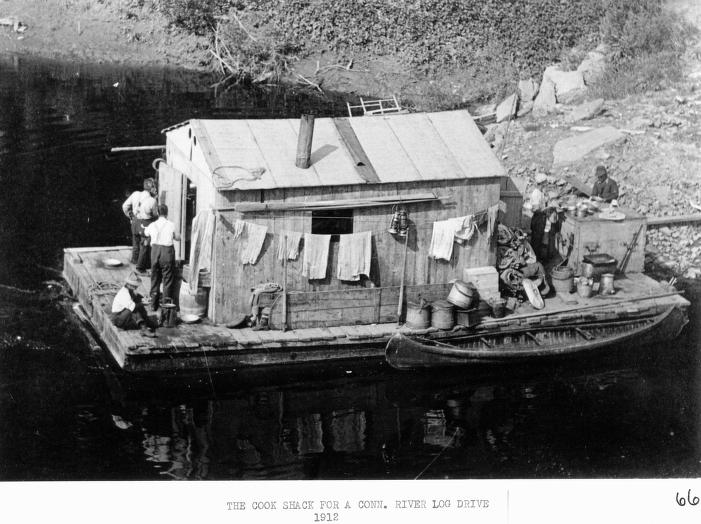
(c) Pocumtuck Valley Memorial Association, Deerfield MA. All rights reserved.
Contact us for information about using this image.
| label levels: |
 |
 |
From the 1800's to early in the 20th century, cook shacks like this one accompanied the flotilla of flat-bottomed, raft-like boats carrying men and horses working the "log drives" on the Connecticut River. Like a chuck wagon on a cattle drive or the caboose on a train, these floating kitchens provided male cooks (often young men or boys) with food storage and stoves to prepare food for the crews of 60 to 70 "log drivers" along the way. "Driving logs" -keeping the logs from jamming and breaking up log jams when they did- was a dangerous, cold, wet and demanding job. The workers needed food regularly, eating as often as four times a day.
Log drives began once the river ice broke up in the spring. They moved a massive amount of lumber, as much as 60,000,000 board feet at a time. They continued for about four months, usually June through September, until the last of the logs, harvested in Vermont and New Hampshire forests the previous winter, arrived at lumber and papermaking mills down river in Massachusetts and Connecticut.
In this photograph the cook appears to be drying the dishes at one end of the boat (on a box which might well be his "ice box") while log drivers are shaving and washing-up at the other end, perhaps using the cook shack's stove for hot water. The log drivers slept on shore in tents pitched near the cook shack. Note the poles stored on the walls above the shack's window. These were used to raft the cook shack up and down the river to points where the men were working. The cook shacks would have to be pulled by teams of horses around any waterfalls. The canoe moored to the cook shack would have been used by the log drivers to reach the cook shack or camp, or go to taverns along the river.
top of page
|
Log Drive Cook Shack on Connecticut River
| photographer Unidentified |
| date 1912 |
| item type Photograph/Photograph |
| accession # #1996.37.01.066 |
 Send an e-Postcard of this object Send an e-Postcard of this object
|







